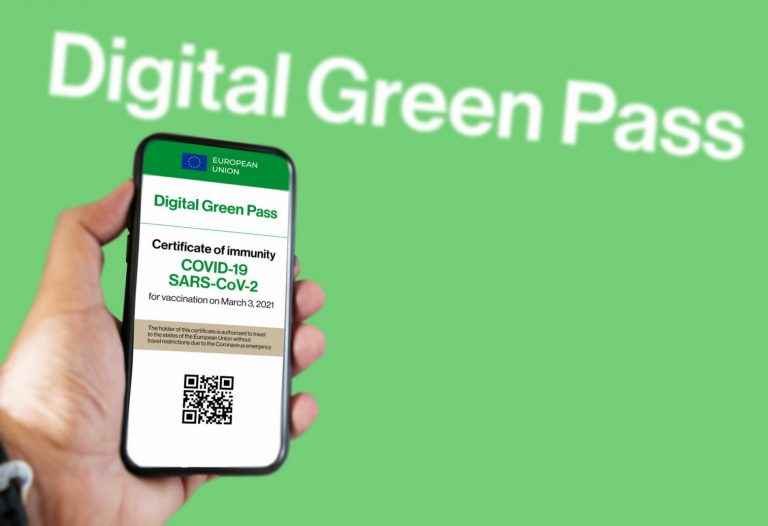
The most important privilege for those who care to be vaccinated against the coronavirus, contributing to the war against the pandemic, is taking shape today in 33 European countries. The new “green pass”, the European Digital Certificate against Covid-19, also known as the “freedom passport” is implemented with the aim of facilitating safe travel within the European Union.
The European Digital Certificate is available in digital and printed form, contains identification (name, date of birth) and mainly information related to the vaccine (vaccine type, number of doses, date of vaccination) or, in the case of a diagnostic test, date and type of test , positive or negative result) and contains a QR Code that can be checked by the transport companies (plane, train, ship) and the police.
The Green Pass is the same in the 27 countries of the European Union and six more European countries (Andorra, Iceland, Liechtenstein, Monaco, Norway, Switzerland), while the entry and exit rules vary depending on the destination.
For example, if you plan to travel to France from another European country, you need either certification of a complete vaccination schedule (two weeks after the second dose or four weeks for the Johnson & Johnson vaccine) or a PCR or antigen test of up to 72 hours.
The time required to perform a test is reduced to 48 hours in some countries, and a positive test (usually six months or less) may also be accepted as proof of recovery from an illness.
In countries such as France, the European Digital Certificate will allow entry to sporting and cultural events involving more than 1,000 people.
For countries where the “green pass” is not yet ready, a transitional period of six weeks (until 12 August) is foreseen, during which other documents, such as a vaccination certificate in paper form, may be presented at the border.
What is most important is that the Certificate will be accepted in all EU Member States. Every citizen who has it should be exempted from restrictions on free movement in the same way as the citizens of the Member State they are visiting.
Everything you need to know
What is a digital certificate and when is it issued?
The document with which a citizen can travel faster within the European Union and is issued
- If the person concerned has completed the vaccination process, or
- If the person concerned has been ill in recent months, or
- if the person has recently undergone a diagnostic test (PCR or rapid test).
It is noted that in case it has undergone more than one diagnostic test, the certificate is issued with the result of the most recent.
When is it valid
It will be officially implemented by the European Union from 1 July 2021.
Greece, however, applies it from June 1st and until July 1st, its certification during the audits is done in cooperation with countries that have respectively prepared their own relevant document.
How long will it be valid for
Each state has the power to determine the times that determine whether the above make a certificate valid. Travelers are advised to contact the competent authorities to find out if their certificate is valid.
What will happen to the certificate already issued
Greece so far issues a certificate of participation in the vaccination which will be valid even after the adoption of the EU Digital COVID Certificate. In fact, this will be valid in case of control for travel by boat or plane within the country and for as long as there are restrictions on travel to the islands. For trips abroad, however, the Digital Certificate will be used.
Can I travel without it?
The digital certificate is a “fast lane”. Free movement within the European Union cannot be hindered as it is a fundamental right. In case a citizen who does not have it, wishes to travel, he or she must either issue it or follow the measures set by his country of destination.
How it will be issued
The national authorities of each country will be responsible for issuing the certificate. As far as Greece is concerned, initially the European Digital Certificate COVID will be issued free of charge by the citizens through gov.gr either using their personal passwords for Taxisnet (tax registration) or AMKA (social security number) and they will be able to bring it in digital form or printed.
If the citizen does not have access to digital services, he will be able to be served through the Citizens’ Service Centers within the next few days.
Who implements it and what personal data it contains
It has a QR code with a digital signature, while its content is written in both the national language and English, so that it is valid in all EU countries. It will also contain only the necessary basic information, such as name, date of birth, date of issue , vaccine / test / recovery information and a unique identification code.
The EU Digital COVID Certificate is implemented in Greece by GRNET – National Infrastructures for Research and Technology and e-Government Center for Social Security (IDIKA), with the participation of the General Secretariat of Information Systems of Public Administration and the supervision of the Ministry of Digital Government.
How its authenticity is checked
The European Commission has set up a portal through which all signatures on certificates can be verified throughout the EU. The personal data of the holder of the European Digital Certificate COVID does not go through the portal, as this is not necessary for the verification of the digital signature.
Latest News

Airbnb: Greece’s Short-Term Rentals Dip in March Amid Easter Shift
Data from analytics firm AirDNA shows that average occupancy for short-term rentals dropped to 45% in March, down from 49% the same month last year.

Easter Week in Greece: Holy Friday in Orthodoxy Today
At the Vespers service on Friday evening the image of Christ is removed from the Cross and wrapped in a white cloth

Meloni and Trump Meet in Washington, Vow to Strengthen Western Ties
“I am 100% sure there will be no problems reaching a deal on tariffs with the EU—none whatsoever,” Trump stressed.

ECB Cuts Interest Rates by 25 Basis Points in Expected Move
The ECB’s Governing Council opted to lower the deposit facility rate—the benchmark for signaling monetary policy direction—citing an updated assessment of inflation prospects, the dynamics of underlying inflation, and the strength of monetary policy transmission.

Current Account Deficit Fell by €573.2ml Feb. 2025: BoG
The improvement of Greece’s current account was mainly attributed to a more robust balance of goods and, to a lesser extent, an improved primary income account

Hellenic Food Authority Issues Food Safety Tips for Easter
Food safety tips on how to make sure your lamb has been properly inspected and your eggs stay fresh.

Greek Kiwifruit Exports Smash 200,000-Ton Mark, Setting New Record
According to data by the Association of Greek Fruit, Vegetable and Juice Exporters, Incofruit Hellas, between September 1, 2024, and April 17, 2025, kiwifruit exports increased by 14.2%.

Easter Tourism Boom: Greece Sees 18.3% Surge in Hotel Bookings
Among foreign markets, Israel has emerged as the biggest growth driver, with hotel bookings more than doubling—up 178.5% year-on-year.

Greece to Launch Fast-Track Tender for Offshore Hydrocarbon Exploration
Last week, Papastavrou signed the acceptance of interest for the two Cretan blocks, while similar decisions regarding the two Ionian Sea blocks were signed by his predecessor

American-Hellenic Chamber of Commerce to Open Washington D.C. Branch
AmCham's new office aims aims to deepen U.S.-Greece economic ties and promote investment and innovation between the two countries







![Πλημμύρες: Σημειώθηκαν σε επίπεδα ρεκόρ στην Ευρώπη το 2024 [γράφημα]](https://www.ot.gr/wp-content/uploads/2025/04/FLOOD_HUNGRY-90x90.jpg)




![Airbnb: Πτωτικά κινήθηκε η ζήτηση τον Μάρτιο – Τι δείχνουν τα στοιχεία [γράφημα]](https://www.ot.gr/wp-content/uploads/2024/07/airbnb-gba8e58468_1280-1-90x90.jpg)

























![Airbnb: Πτωτικά κινήθηκε η ζήτηση τον Μάρτιο – Τι δείχνουν τα στοιχεία [γράφημα]](https://www.ot.gr/wp-content/uploads/2024/07/airbnb-gba8e58468_1280-1-600x500.jpg)


 Αριθμός Πιστοποίησης
Αριθμός Πιστοποίησης